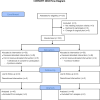Effects of Perioperative Dexmedetomidine on Immunomodulation in Uterine Cancer Surgery: A Randomized, Controlled Trial
- PMID: 34868950
- PMCID: PMC8635094
- DOI: 10.3389/fonc.2021.749003
Effects of Perioperative Dexmedetomidine on Immunomodulation in Uterine Cancer Surgery: A Randomized, Controlled Trial
Abstract
Objective: Dexmedetomidine has sympatholytic, anti-inflammatory, and analgesic effects and may exert anti-tumor effect by acting on α2A adrenoreceptor. We investigated whether perioperative dexmedetomidine preserves immune function in patients undergoing uterine cancer surgery.
Methods: One hundred patients were randomly assigned to the control or dexmedetomidine groups (50 patients each). Dexmedetomidine was infused at rates of 0.4 μg/kg/h intraoperatively and 0.15 μg/kg/h during the first 24 h postoperatively. The primary outcome was natural killer (NK) cell activity, which was measured preoperatively and 1, 3, and 5 days postoperatively. The inflammatory response was measured by interleukin-6, interferon-γ, and neutrophil/lymphocyte ratio, and pain scores and opioid consumption were assessed. Cancer recurrence or metastasis and death were evaluated 2 years postoperatively.
Results: NK cell activity decreased postoperatively in both groups and changes over time were not different between groups (P=0.496). Interferon-γ increased postoperatively in the dexmedetomidine group, whereas it maintained at the baseline value in the control group. Change in interferon-γ differed significantly between groups (P=0.003). Changes in interleukin-6 and neutrophil-lymphocyte ratio were comparable between groups. Both pain score with activity during the first 1 h and opioid consumption during the first 1-24 h postoperatively were lower in the dexmedetomidine group. Rates of cancer recurrence/metastasis (16.3% vs. 8.7%, P=0.227) and death within 2 years postoperatively (6.7% vs. 2.2%, P=0.318) were not different between groups.
Conclusions: Perioperative dexmedetomidine had no favorable impacts on NK cell activity, inflammatory responses, or prognosis, whereas it increased interferon-γ and reduced early postoperative pain severity and opioid consumption in uterine cancer surgery patients.
Keywords: dexmedetomidine; immunity; interferon-γ; natural killer cell; uterine cancer.
Copyright © 2021 Cho, Seon, Kim, Kim and Yoo.
Conflict of interest statement
The authors declare that the research was conducted in the absence of any commercial or financial relationships that could be construed as a potential conflict of interest.
Figures



References
LinkOut - more resources
Full Text Sources

